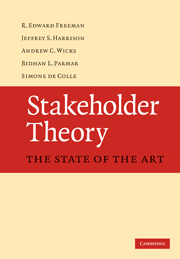Book contents
- Frontmatter
- Contents
- List of figures
- List of tables
- Acknowledgements
- Preface
- Part I The genesis of stakeholder theory
- Part II Stakeholder theory and the traditional disciplines of business
- 4 Stakeholder theory and strategic management
- 5 Stakeholder theory in finance, accounting, management, and marketing
- 6 Stakeholder theory in related disciplines
- Part III Stakeholder theory, ethics, and corporate social responsibility
- Part IV Stakeholder theory: some future possibilities
- Bibliography
- Index
5 - Stakeholder theory in finance, accounting, management, and marketing
from Part II - Stakeholder theory and the traditional disciplines of business
Published online by Cambridge University Press: 05 June 2012
- Frontmatter
- Contents
- List of figures
- List of tables
- Acknowledgements
- Preface
- Part I The genesis of stakeholder theory
- Part II Stakeholder theory and the traditional disciplines of business
- 4 Stakeholder theory and strategic management
- 5 Stakeholder theory in finance, accounting, management, and marketing
- 6 Stakeholder theory in related disciplines
- Part III Stakeholder theory, ethics, and corporate social responsibility
- Part IV Stakeholder theory: some future possibilities
- Bibliography
- Index
Summary
Stakeholder theory is beginning to have a greater reach in the academic literature on business. The purpose of this chapter is to examine how it has been applied in the four major business disciplines – finance, accounting, management, and marketing (economics was addressed earlier, in Chapter 1, and strategic management in Chapter 4). This chapter suggests that researchers have selected those portions of the theory that are most applicable to the questions they are trying to answer. Integration of stakeholder concepts with the theories of their own discipline has occurred; however, this integration has not, unfortunately, contributed much to the core stakeholder literature. In other words, stakeholder theory has informed the business disciplines, but the disciplines have done little to inform stakeholder theory. Perhaps another way to say this is that stakeholder theorists have not paid adequate attention to the disciplines. We offer the ideas in this chapter as a beginning to bridging this disciplinary gap. There are opportunities for scholars in all the business disciplines to advance both stakeholder theory and practice.
In the next section we shall briefly discuss the emergence of the primary business disciplines. We shall also explain how we have defined the content of each discipline for the purposes of this analysis. Each of the four disciplines has a subsequent section devoted to it.
- Type
- Chapter
- Information
- Stakeholder TheoryThe State of the Art, pp. 121 - 162Publisher: Cambridge University PressPrint publication year: 2010

